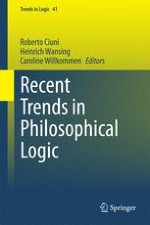2014 | OriginalPaper | Buchkapitel
On the Essential Flatness of Possible Worlds
verfasst von : Neil Kennedy
Erschienen in: Recent Trends in Philosophical Logic
Aktivieren Sie unsere intelligente Suche, um passende Fachinhalte oder Patente zu finden.
Wählen Sie Textabschnitte aus um mit Künstlicher Intelligenz passenden Patente zu finden. powered by
Markieren Sie Textabschnitte, um KI-gestützt weitere passende Inhalte zu finden. powered by
